Reactions to Sumter
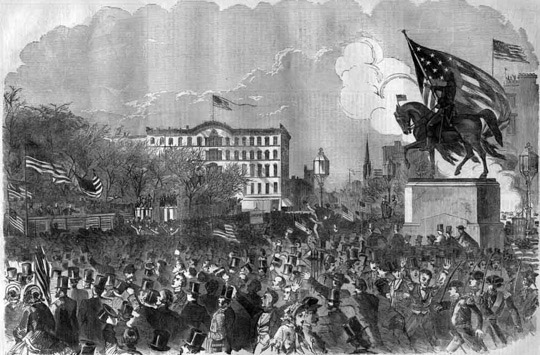
Once Virginia seceded from the Union, Confederate troops occupied the Federal arsenal at Harper's Ferry. Federal troops responded immediately and forced the Confederate troops out of what became the state of West Virginia.
.
Sumter had fallen- now it was Lincoln's turn to respond. He did so by a call for troops: Lincoln stated " Now I, Abraham Lincoln, President of the United States, in virtue of the power in me vested by the constitution, and the laws, have thought fit to call forth, and hereby do call forth, the militia of several States of the Union, to aggregate number of seventy --
The nations responded by a series of meetings in every part of the North. Thousands came forth with enthusiasm. A New York mother of five sons who enlisted stated:" I was startled by the news referring to our boys, and, for the moment felt as if a ball had pierced my own heart. For the first time I was obliged to look things full in the face. But although I have always loved my children with a love that none but a mother can know, yet when I look upon the state of my country, I cannot withhold them; and in the name of their god and their mothers god, and their country's god I bid them to go. If I had ten sons instead of five I would give them all sooner than have our country rent in fragments."
A Baltimore mother wrote to her son a Boston Clergyman " My dear son: Your remarks last Sabbath were telegraphed to Baltimore and published in a extra. has god sent you to preach the sword, or to preach Christ'? His reply: Dear Mother: "God has sent me not only to preach the sword but to use it, when this government tumbles look amongst the ruins for Your Star Spangled Son."
While the call for militia succeeded in raising an army, it was the final blow in the attempts to keep the Virginia and other wavering states in the Union. The Border states and the states of the Upper South all responded with words similar to those of Kentucky:" Kentucky will furnish no troops for the wicked purpose of subduing her sister southern states."
Virginia was the first Southern state to secede, and with her the man who was to become the South leading General - Robert E. Lee. Lee was a reluctant sessionist, he had stated two months earlier" I fear the liberties of our country will in the tomb of the great nation.. If Virginia stands by the old Union so will I. But if she secedes ( though I do not believe in secession as a constitutional right, nor that there is sufficient cause for revolution) then I will sill follow my native State with my sword, and if need be, with my life."
Next Arkansas joined the confederacy, they were followed in May by North Carolina and Tennessee. The border states of: Maryland, Kentucky, Missouri and Delaware, were key. Delaware was going to remain in the Union- The rivers through Kentucky- the Cumberland and Tennessee were a highways into the deep South. The most important state for the moment- was Maryland. For it was through Maryland that any reinforcements to Washington had to pass. The first soldiers to pass were a group of Pennsylvania militias who passed through Baltimore accompanied by hooting and hissing, but no more.. This was not the case when on April 19th the 6th Massachusetts Regiment arrived in Baltimore. Trains did not pass directly through Baltimore, but rather cars had to be pulled by horses from the President Street Station to the B&O Camden Street Station. The first 9 cars crossed between the stations without much difficulty, but by then the crowds had grown, and the way was blocked. 220 men were stranded at President station. They started out on foot, meeting an increasingly hostile crowd. The soldiers were stoned and soon shots were fired. All told before the soldiers could extricate themselves from the city, 4 soldiers were killed and 36 wounded. Twelve citizens of Baltimore died in the skirmishes. The first blood was spilled.
Immediately following the riots secessionists in Baltimore destroyed the railroads bridges and the telegraph lines thus cutting off Washington. For days Washington was cut off, with no additional replacement troops coming. Panic reined in Washington- Lincoln looked out the White House windows wondering when reinforcements would show. Finally in April 25th the 8th Mass Infantry and the 7th New York Regiment, landed at Annapolis Maryland. The New York Regiment managed to repair a branch line of the B&O that had been sabotaged and soon they arrived in the capital, whose citizens breathed a collective sigh of relief.
Governor of Mass. Correspondence
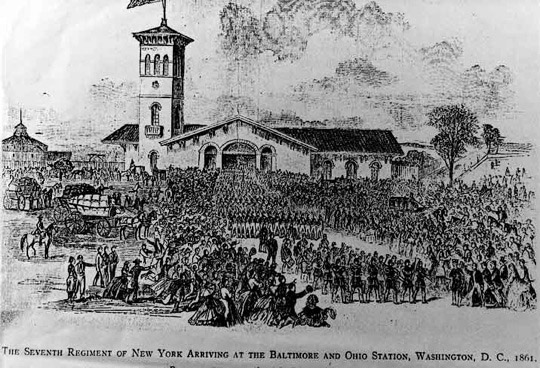
This illustration of New York Volunteers arriving at the Baltimore and Ohio rail station in Washington.
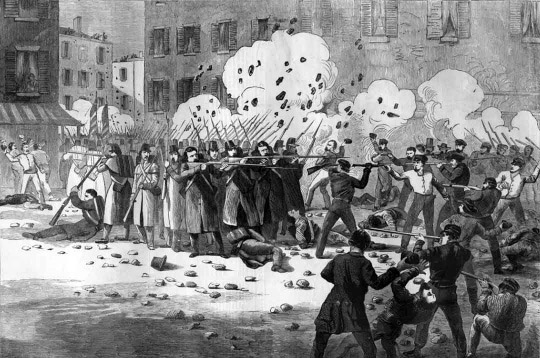
This illustration from Harpers Weekly of fighting in Baltimore as Federal volunteers attempted to cross the city that city
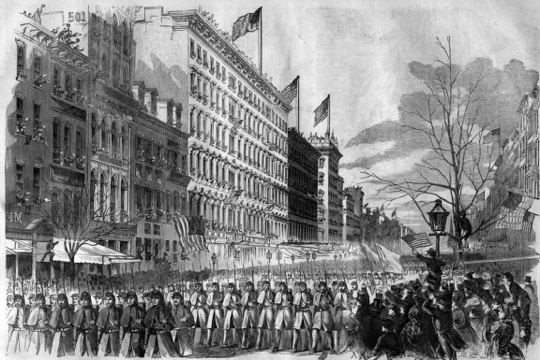
This illustration from Harpers Weekly of New York Volunteers marching down Broadway in New York City.
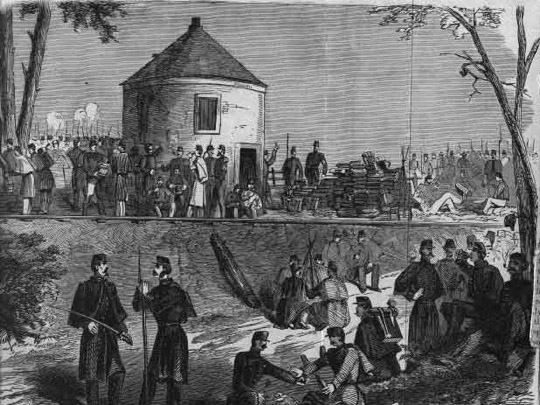
This illustration of New York Volunteers resting on the way to Washington..
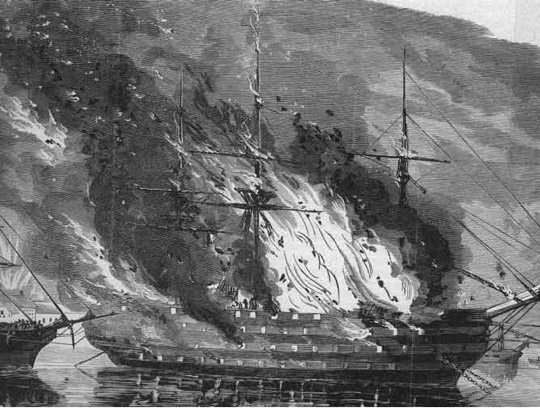
This illustration of the USS Pennsylvania being burned in the Norfolk Naval Yards.
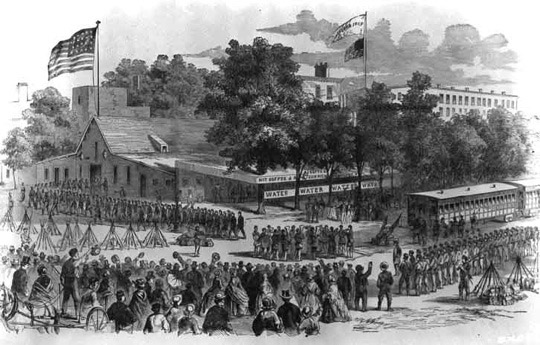
This is an illustration of volunteers passing through Philadelphia on the way to Washington.
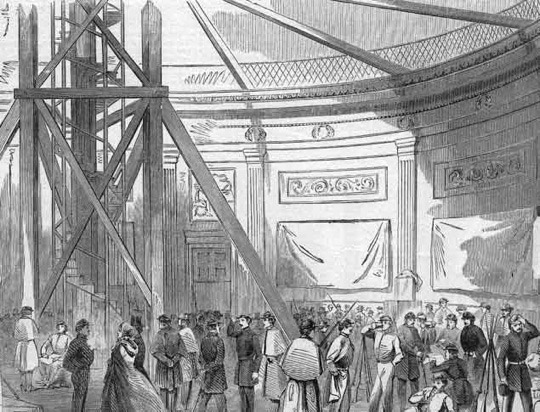
This illustration of 8th Massachusetts Volunteers in the Capital Rotunda.

This illustration from Harpers Weekly shows a rally taking place in New York in support of the Union.
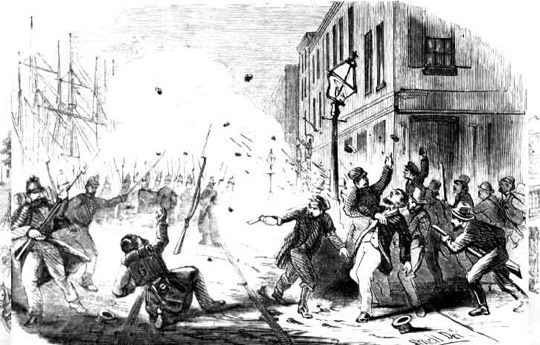
 >
>